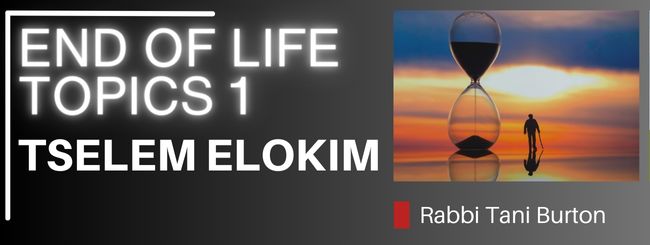בס”ד
- Mortality
- Genesis 3:19
| By the sweat of your brow shall you eat bread, until you return to the ground; for you were taken from the dust, and to the dust you shall return. | בְּזֵעַ֤ת אַפֶּ֙יךָ֙ תֹּ֣אכַל לֶ֔חֶם עַ֤ד שֽׁוּבְךָ֙ אֶל־הָ֣אֲדָמָ֔ה כִּ֥י מִמֶּ֖נָּה לֻקָּ֑חְתָּ כִּֽי־עָפָ֣ר אַ֔תָּה וְאֶל־עָפָ֖ר תָּשֽׁוּב׃ |
II. Burial
2. Deuteronomy 21:22-3
| And if a man has sinned in such a way as to be liable to capital punishment, and he is executed, and hung on a tree; you shall not allow his corpse to remain there, but rather you shall bury it on that same day. For any hanging corpse is a desecration to G-d, and you may not defile the land that the L-rd your G-d has given you as an inheritance. | וְכִֽי־יִהְיֶ֣ה בְאִ֗ישׁ חֵ֛טְא מִשְׁפַּט־מָ֖וֶת וְהוּמָ֑ת וְתָלִ֥יתָ אֹת֖וֹ עַל־עֵֽץ׃ לֹא־תָלִ֨ין נִבְלָת֜וֹ עַל־הָעֵ֗ץ כִּֽי־קָב֤וֹר תִּקְבְּרֶ֙נּוּ֙ בַּיּ֣וֹם הַה֔וּא כִּֽי־קִלְלַ֥ת אֱלֹק֖ים תָּל֑וּי וְלֹ֤א תְטַמֵּא֙ אֶת־אַדְמָ֣תְךָ֔ אֲשֶׁר֙ יְ”הֹוָ֣ה אֱלֹקיךָ נֹתֵ֥ן לְךָ֖ נַחֲלָֽה |
3. Rashi. Loc. cit.
| A desecration of the King, for man was made in His Image, and Israel is His firstborn. A parable of two identical twin brothers: one becomes the king and the other, a highway robber, who is caught and hung. Anyone who sees his hanged corpse will say, “the king has been hanged!” | כי קללת אלהים תלוי. זִלְזוּלוֹ שֶׁל מֶלֶךְ הוּא, שֶׁאָדָם עָשׂוּי בִּדְמוּת דְּיוֹקָנוֹ, וְיִשְׂרָאֵל הֵם בָּנָיו; מָשָׁל לִשְׁנֵי אַחִים תְּאוֹמִים שֶׁהָיוּ דּוֹמִים זֶה לָזֶה, אֶחָד נַעֲשָׂה מֶלֶךְ וְאֶחָד נִתְפַּס לְלִסְטִיּוּת וְנִתְלָה, כָּל הָרוֹאֶה אוֹתוֹ אוֹמֵר הַמֶּלֶךְ תָּלוּי. |
III. The central principle: man is created in the Image of G-d
4. Genesis 1:27
| And G-d created man in His Image; in the Image of G-d did He create him; male and female He created them. | וַיִּבְרָ֨א אֱלֹקים ׀ אֶת־הָֽאָדָם֙ בְּצַלְמ֔וֹ בְּצֶ֥לֶם אֱלֹקים בָּרָ֣א אֹת֑וֹ זָכָ֥ר וּנְקֵבָ֖ה בָּרָ֥א אֹתָֽם׃ |
5. Rambam, Sefer HaMitzvot, Positive Commandment #231
| We are commanded to bury those who have been executed by the court on the day of their execution. The verse states, “you shall surely bury him etc.” (Deuteronomy 21:22) This is a positive commandment, and extends to all the dead, meaning, that all Jewish corpses must be buried on the day of their death. Therefore, any case where the deceased have no one to see to their burial is considered met mitzvah, meaning that it is incumbent upon any person to bury the dead, as the verse states, “you shall surely bury him”. | היא שצונו לקבור הרוגי בית דין ביום שנהרגו. והוא אמרו יתעלה כי קבור תקברנו ביום ההוא. ולשון ספרי כי קבור תקברנו מצות עשה והוא הדין בשאר מתים רוצה לומר שנקבור כל מתי ישראל ביום מותם. ולכן המת שאין לו מי שיתעסק בקבורתו נקרא מת מצוה כלומר המת שמצוה על כל אדם לקברו באמרו קבור תקברנו |
6. Avot 3:14
| He (Rabbi Akiva) would say, “beloved is man, for he was created in the Image of G-d. An additional measure of love is evident in G-d’s informing him that he was created in the Image of G-d.” | הוּא הָיָה אוֹמֵר, חָבִיב אָדָם שֶׁנִּבְרָא בְצֶלֶם. חִבָּה יְתֵרָה נוֹדַעַת לוֹ שֶׁנִּבְרָא בְצֶלֶם, שֶׁנֶּאֱמַר (בראשית ט) כִּי בְּצֶלֶם אֱלֹקים עָשָׂה אֶת הָאָדָם. |
By Rabbi Tani Burton
© Copyright, all rights reserved. If you enjoyed this article, we encourage you to distribute it further.
Our blogs may contain texts/ quotes or references of
Mechon-Mamre.org, Aish.com, Sefaria.org or AskNoah.org
that contain copyrights and which we may use with there permission.
